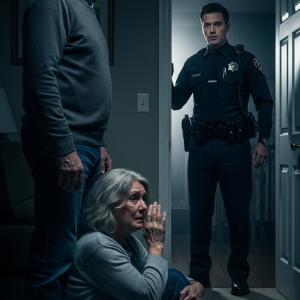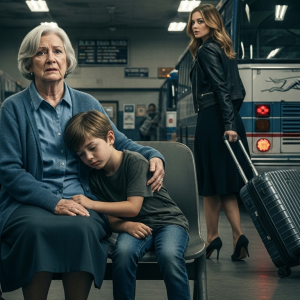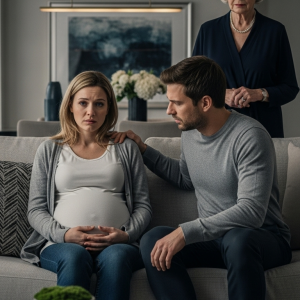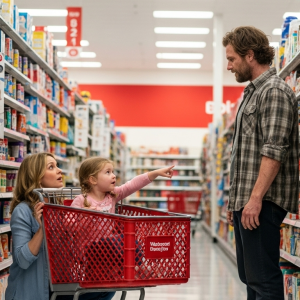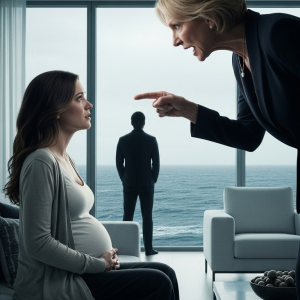I stepped into the cold, sterile courtroom that morning with a hollow feeling in my chest, a certainty that I was about to lose the one part of my life that still made sense: my daughter. I had rehearsed every possible failure in my mind, bracing for the judge’s verdict to sever me from her daily life, reducing me to a weekend footnote in her story.
But then, in the suffocating silence of that room, she spoke. Just seven small words from a five-year-old girl, and the entire world shifted on its axis.
I never imagined that my life—a life I had meticulously built to be steady, secure, and unshakeable—could be demolished so completely within the four walls of a family court. It was a place where truth was a commodity, and love was an argument to be won or lost.
My name is Marcus Grant. I’m thirty-five, and until six months ago, I believed I had mastered the art of living. I was a technology consultant, a job that demanded my time and my soul but paid me handsomely for the sacrifice. My work was a fortress of logic and solutions, a world I understood.
This fortress paid for a beautiful house in a quiet suburban neighborhood, the kind you see in movies, with perfectly manicured lawns and the distant, happy sound of children riding their bikes down the street. From the outside, we were the picture of success. I had, for all intents and purposes, a solid marriage.
For seven years, I was married to Laura. To the outside world, she was radiant. She possessed a natural charisma that drew people in, a magnetic energy that made her the center of every room. She was witty, sharp, and her laughter was a melody that once felt like home.
She worked in human resources, and I used to love hearing her stories about office politics, the petty dramas over potluck lunches, and the elaborate Secret Santa exchanges. Her ability to find humor in the mundane was one of the first things I fell in love with. Back then, her laughter was my favorite sound.
Together, we had Chloe. My little girl. She is five years old, with a heart so pure and a mind so thoughtful it often leaves me breathless. She sees the world with a gentle wisdom that belies her age.
Her constant companion is a stuffed bunny named Mr. Whiskers. His fur is worn down to the threads in places, his ears are hopelessly floppy, and one of his button eyes is loose. But to Chloe, he is not a toy; he is her confidant, her anchor, and she treats him with the solemnity of a sacred guardian.
I have to admit a difficult truth, one that I’ve replayed in my mind a thousand times since everything fell apart: I wasn’t always the best husband. My ambition was a relentless master. I was a ghost in my own home, my presence often reduced to a voice on the phone or a face on a video call.
My job demanded constant travel. I flew across the country for conferences, stayed in sterile hotels for client meetings, and worked late into the night on complex projects. I told myself a comforting lie: that I was sacrificing time with them for them. I reasoned that my absence was the price for their security, their future.
Looking back, I see the flaw in my logic. I provided them with a beautiful house but failed to make it a home. I gave them financial comfort but starved them of my presence. I was the architect of a perfect life that I was never around to live in. Still, nothing could have prepared me for the way it would all come crashing down.
It was a Tuesday last February. I was in Chicago for a major client pitch that, against all odds, wrapped up a full day ahead of schedule. A sudden, exhilarating wave of freedom washed over me. My first thought was, Laura. My second was, Surprise her.
On the drive home from the airport, I felt a giddy sense of anticipation I hadn’t felt in years. I stopped at La Dolce Vita, her favorite Italian bakery, the one we used to visit on lazy Sunday afternoons. I bought a large slice of tiramisu, her absolute favorite, the rich scent of coffee and cocoa filling my car.
I remember every detail of that moment. I unlocked the front door, the familiar click echoing in the sudden silence. I held the pristine white pastry box in my hands, a peace offering for my absence, a symbol of my return. I pictured her face lighting up, the surprise turning into a warm smile.
But the house was unnervingly quiet. There was no television humming in the background, no sound of Chloe’s cartoons, no footsteps from upstairs. A faint, unfamiliar scent hung in the air—a cloying men’s cologne that wasn’t mine. A cold knot began to tighten in my stomach.
Still holding the dessert, I climbed the stairs, my own footsteps seeming to thunder in the stillness. I pushed open our bedroom door, the word “Honey?” already forming on my lips. It died there, unspoken.
Laura didn’t see me at first. She was… occupied. Her head was thrown back in laughter, a sound so carefree it felt like a physical blow. She was with Joel.
Joel. The coworker she had always dismissed as “awkward but harmless, completely not my type.” Except there he was, very much her type, tangled in the sheets of our bed—my bed. The sanctuary where I slept, where we had dreamed of a future, where our daughter was conceived, had been desecrated.
The world slowed to a crawl. I didn’t yell. I didn’t throw the tiramisu. I simply stood there, frozen in the doorway, a ghost in my own life, watching the foundations of my world turn to dust. The white box in my hand suddenly felt impossibly heavy, a ridiculous relic from a life that had ceased to exist seconds earlier.
When she finally saw me, a strangled gasp escaped her lips. Her eyes widened in panic as she fumbled for the sheets to cover herself. Joel’s face, which had been flush with pleasure, instantly drained of all color. He froze like a startled animal, his mouth agape.
“Marcus… wait, I can explain—” Laura started, her voice a frantic whisper.
But I cut her off. My own voice was terrifyingly calm, detached, as if it belonged to someone else. “No,” I said, the single word hanging in the air, final and absolute. “There’s nothing left to say.”
That night, I checked into a sterile, anonymous hotel room. The silence was deafening. By sunrise, my fingers were dialing the number of the best divorce attorney I could find.
The word “divorce” had never been spoken between us, not even during our most heated arguments. But once the proceedings began, it was like a wildfire tearing through a dry forest, consuming everything in its path. Laura, wasting no time, hired a formidable attorney of her own.
She called me, her voice alternating between tearful apologies and sharp accusations. She spoke of loneliness, of feeling abandoned. “You were never here, Marcus!” she’d cried over the phone. “I was a single mother in a marriage. Joel… he was just there. He saw me.” She skillfully reframed her betrayal as a consequence of my failures, making me the villain in the story of her affair.
But my anger wasn’t just for me. It was a cold, protective rage that centered entirely on Chloe. My sweet, innocent girl, who would now be torn between two fractured homes, her life dictated by a custody schedule.
On the weekends I had her, she would curl up on my lap, clutching Mr. Whiskers, her small body a warm weight against my chest as we watched cartoons. She was my anchor in the storm, the one pure, good thing left. The thought of being demoted to a “holiday father,” seeing her life only in scheduled snapshots, was a physical sickness.
So I made a decision. It wasn’t about revenge. It was about love. I would fight for full custody.
My attorney, Cassandra, was a sharp, no-nonsense woman with tired eyes that had seen it all. She didn’t offer comforting platitudes. She offered reality.
“Marcus, let’s be perfectly clear,” she said, her voice blunt. “The courts have a strong bias toward the mother, especially for a child this young. Unless you can prove gross neglect or abuse, Laura’s infidelity will be seen as a marital issue, not a parenting one. It doesn’t automatically make her an unfit mother.”
“I understand that,” I told her, my jaw tight. “But I can’t just roll over. Chloe has to know that her father fought for her. When she’s older, she needs to know she was worth fighting for, that she was my absolute priority.”
Cassandra nodded slowly, a flicker of something—perhaps respect—in her eyes. “Alright,” she said. “Then prepare for a battle. They will use your work, your travel, every missed school play and parent-teacher conference against you. They will paint you as an absentee father who only wants custody now out of spite.” And she was right.
The courtroom was nothing like I’d imagined from television dramas. It wasn’t a grand hall of justice; it was a small, suffocating room that smelled of old paper and anxiety. It didn’t feel like a place for fairness; it felt like a stage for a brutal performance.
Laura’s lawyer, a man named Peterson, was smooth and polished. He moved with a confident swagger, his voice a well-rehearsed symphony of persuasive rhetoric. He painted Laura as a saint, the quintessential mother who sacrificed everything for her child.
He presented a slideshow of photos: Laura and Chloe at the zoo, Laura baking cupcakes for a school fundraiser, Laura at every doctor’s appointment. Each picture was a dagger, highlighting a moment I had missed. He masterfully used my travel schedule, my own hard work, as the primary weapon against me, twisting my sacrifice into neglect.
Laura sat across from me, a portrait of poised sorrow. Her blonde hair was perfectly styled, her makeup flawless. She projected an air of victimhood, a wronged woman seeking only to protect her child. She never once made eye contact with me.
When Cassandra brought up the affair, Peterson brushed it aside with practiced ease. “Your Honor, this was not a malicious act, but a symptom of profound emotional neglect. Mrs. Grant was overwhelmed, raising their daughter almost entirely on her own. The relationship with Mr. Henderson was an unfortunate but understandable consequence of her unmet emotional needs.”
I stared at Laura, waiting for a flicker of shame, of remorse. There was nothing. Her expression remained placid, unwavering. She had accepted this narrative as her truth.
Then Cassandra stood. Her voice was steady, a firm counterpoint to Peterson’s slick performance. “Your Honor, Marcus Grant has always been a deeply devoted father. Yes, his career required travel, but he was never absent from his daughter’s life. He called Chloe every single night, without fail, to read her a bedtime story over the phone. He sent her postcards and small gifts from every city he visited.”
“And when Chloe was hospitalized with a severe flu two years ago,” Cassandra continued, her voice rising with quiet power, “Mr. Grant dropped a multi-million dollar negotiation, got on the first flight he could, and didn’t leave her side for three days. That is not neglect, Your Honor. That is unwavering love and commitment.”
The judge listened, his face an unreadable mask. Laura’s side then paraded a series of witnesses—a neighbor, Chloe’s preschool teacher, even Laura’s yoga instructor. They all praised her as a loving, ever-present mother. Peterson made sure to emphasize that when I found her with Joel, Chloe was safely at daycare, not in harm’s way.
I could feel the case, my entire future, slipping through my fingers like sand. A cold dread settled over me. And then, the unexpected happened.
The judge leaned back in his large leather chair, removed his glasses, and polished them slowly. He looked from Laura to me, his gaze lingering for a moment. Then he spoke the words that would change everything.
“I have heard from the adults,” he said, his voice resonating through the tense silence. “Now, I would like to hear from the child.”
My heart stopped beating. The air was sucked from my lungs. I hadn’t even considered this was a possibility. Bringing a five-year-old into this toxic environment felt cruel, unthinkable.
Laura’s lawyer, Peterson, looked momentarily surprised but quickly schooled his features, offering a slight nod. He likely assumed a five-year-old would naturally cling to her primary caregiver, her mother. Cassandra leaned over to me, her voice a low, urgent whisper. “Don’t react, Marcus. Let it play out. Just stay calm.”
A few moments later, a bailiff led Chloe into the courtroom. She looked so small, so fragile in that imposing room. She was wearing her favorite yellow sundress with little white daisies on it, and her favorite sneakers—the ones that lit up with every step. The quiet, rhythmic flash of red and blue light from her shoes was the only sound in the dead silent room. She was clutching Mr. Whiskers to her chest so tightly her knuckles were white.
The judge’s stern demeanor softened instantly. He leaned forward, offering her a kind, gentle smile. “Hello there, Chloe,” he said, his voice soft. “My name is Judge Albright. I just want to ask you a couple of questions. It’s very important that you answer me as honestly as you can. Can you do that for me?”
Chloe, her eyes wide with a mixture of fear and curiosity, looked from the judge to her mother, then to me. She gave a tiny, hesitant nod.
“Thank you,” the judge said softly. “Chloe, if you could live with just one person, if you had to choose… who would you want to live with? Your mommy or your daddy?”
The air in the room grew thick, heavy. This was the moment. The culmination of everything. Chloe’s gaze fell to the worn fur of her bunny. She hugged Mr. Whiskers tighter, burying her face in him for a second before whispering a reply, so quiet we all had to strain to hear.
“I don’t want to be second place.”
The judge leaned forward even more, his brow furrowed in confusion. “I’m sorry, sweetie, what do you mean by that? Second place to what?”
Chloe took a shaky breath, her little voice trembling but growing clearer with each word. “At daycare… Joel’s little girl, Carol, she told me her daddy is going to marry my mommy soon. She said when they get a new house, he’s her daddy first, and I will have to be second. She laughed at me and said I don’t have a real daddy anymore.”
A collective, sharp intake of breath swept through the courtroom. My own heart felt like it was being squeezed in a vise. I saw Laura’s face go ashen, her perfect composure finally cracking.
Chloe went on, her words now a stream of pure, unvarnished truth. “I don’t want to be second. With Daddy, I’m always first. He lets me paint his nails sparkly pink when I ask, even his toenails. He makes funny voices for all the characters when he reads me stories. And… and he taught me how to make pancakes shaped like Mr. Whiskers.”
Then, she turned her big, innocent eyes toward Laura. “With Mommy… she’s always looking at her phone. The phone with the shiny face. When I ask her to play, she says ‘in a minute’ but the minute never comes. And sometimes… she yells to be quiet when she’s talking to Joel.”
Even Peterson shifted uncomfortably on his feet. The carefully constructed image of the perfect mother was crumbling to pieces, dismantled by the simple, devastating honesty of a child.
Laura leaned forward, panic flashing in her eyes. “Chloe, honey, that’s not true, you know Mommy loves to—”
“Silence!” the judge’s voice boomed, sharp and commanding. He fixed Laura with a glare. “Mrs. Grant, this is Chloe’s time to speak. You will not interrupt her again.”
Laura sank back into her chair, her face a mask of shock and disbelief. I bit the inside of my cheek so hard I tasted blood, fighting back a tidal wave of tears. These weren’t coached words. This was Chloe’s reality, raw and unfiltered. This was the truth she had been living.
The judge turned his attention back to me, his expression now one of intense scrutiny. “Mr. Grant, if I were to award you sole custody, are you prepared to make significant changes to your career? Are you willing to do what is necessary to provide the stability your daughter clearly craves?”
Without a single moment of hesitation, my answer came from the deepest part of my soul. “Yes, Your Honor. Without question. She is everything. I’ve already spoken to my firm. I will take a permanent, non-travel role. I will sell our house. I will do whatever it takes. She deserves to be first in someone’s life, every single day. And I swear, with me, she always will be.”
The judge stared at me for a long moment, then nodded slowly. For the first time in six agonizing months, a fragile sliver of hope pierced through my despair.
After a short recess that felt like a lifetime, the decision was delivered.
“Based on the testimony provided, and in the clear best interest of the child, sole physical and legal custody is granted to the father, Mr. Marcus Grant.”
The words echoed, surreal and powerful. When Chloe was brought back into the room, she saw the tears streaming down my face, and she ran. She launched herself into my arms, and I held her, burying my face in her hair, breathing in the simple, sweet scent of my daughter, my world.
“You will never, ever be second place,” I whispered, my voice thick with emotion. “I promise you.”
Across the room, Laura sat frozen, her expression a toxic cocktail of shock, fury, and utter defeat. She had gambled her daughter’s happiness on a new life with Joel, and she had lost everything.
Outside the courthouse, the afternoon sun felt warmer, the sky a more brilliant blue than I had seen in months. Chloe skipped beside me, her light-up shoes flashing triumphantly on the pavement. Mr. Whiskers peeked out of her little yellow backpack, a silent, fluffy witness to our victory.
I knelt down to her level, my hands on her small shoulders. “How about some ice cream to celebrate?”
A huge grin spread across her face. “Can I have two scoops?”
I smiled through my tears, my heart feeling lighter than it had in years. “Today, my love,” I said, my voice choked with gratitude, “you can have three.”
That very night, I made the call to my boss and formally accepted the local management position I had been discussing. The next week, I put the house—our house—on the market. It was full of too many ghosts. We bought a smaller, cozier place just a few blocks from Chloe’s school.
We spent a whole weekend decorating her new room. I let her choose everything. We painted the walls a vibrant shade of pink she called “unicorn magic” and spent an entire evening carefully sticking glow-in-the-dark stars all over her ceiling, creating constellations of our own.
We built a new life, brick by brick, laugh by laugh. It was a life built on presence, not presents. We instituted Pancake Sundays, where we’d make messes with flour and chocolate chips. We had Nail-Painting Thursdays and Story-Time every single night, complete with all the silly voices that made her giggle until she couldn’t breathe.
When she would occasionally ask, with the innocent curiosity of a child, why Mommy didn’t live with us anymore, I answered gently and honestly, without bitterness. I told her that sometimes adults make mistakes, and that both Mommy and Daddy loved her very, very much. Her heart deserved peace, not the heavy burden of our anger.
I never imagined my marriage would end in such a spectacular flame of betrayal, or that a brutal custody battle would become the defining chapter of my life. But I also never imagined that the simple, profound truth, spoken from the heart of a five-year-old girl, would be my salvation.
Chloe taught me a lesson my ambition had made me forget: love isn’t about what you provide; it’s about showing up. It’s about putting down your phone, closing your laptop, and being present in the small, sacred moments that make up a life. It’s about making someone feel like they are the center of your universe.
First, not second. Never second.
In the end, it turned out I had it all backward. I thought I needed to save her, to fight for her. But the truth is, she was the one who saved me. She gave me my purpose back with just seven little words:
“I don’t want to be second place.”
Because to her, I was always first. And now, I finally had the chance to prove she would always be mine.
